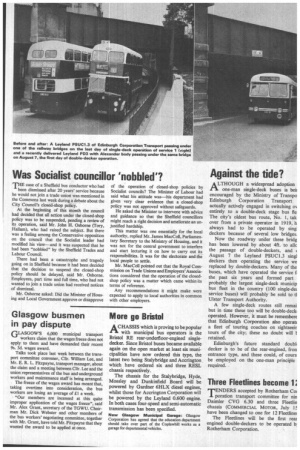Was Socialist councillor 'nobbled'?
Page 43

If you've noticed an error in this article please click here to report it so we can fix it.
THE case of a Sheffield bus conductor who had
been dismissed after 20 years' service because he would not join a trade union was mentioned in the Commons last week during a debate about the City Council's closed-shop policy.
At the beginning of this month the council had decided that all action under the closed-shop policy was to be suspended, pending a review of its operation, said Mr. John II. Osborne (Tory, Hallam), who had raised the subject. But there was a feeling among the Conservative opposition on the council that the Socialist leader had modified his view—and it was suspected that he had been "nobbled" by the Sheffield Trades and Labour Council.
There had been a catastrophe and tragedy going on in Sheffield because it had been decided that the decision to suspend the closed-shop policy should be delayed, said Mr. Osborne. Employees, part time and full time, who had not wanted to join a trade union had received notices of dismissal.
Mr. Osborne asked: Did the Minister of Housing and Local Government approve or disapprove of the operation of closed-shop policies by Socialist councils? The Minister of Labour had said what his attitude was—his department had given very clear evidence that a closed-shop policy was not approved without safeguards.
He asked the Minister to intervene with advice and guidance so that the Sheffield councillors might reach a right decision and ameliorate an unjustified hardship.
This matter was one essentially for the local authority, replied Mr. James MacColl, Parliamentary Secretary to the Ministry of Housing, and it was not for the central government to interfere and start lecturing it on how to carry out its responsibilities. It was for the electorate and the local people to settle.
Mr. MacColl pointed out that the Royal Commission on Trade Unions and Employers' Associations considered that the operation of the closedshop policy was a matter which came within its terms of reference.
Any recommendations it might make were expected to apply to local authorities in common with other employers.




































































































































